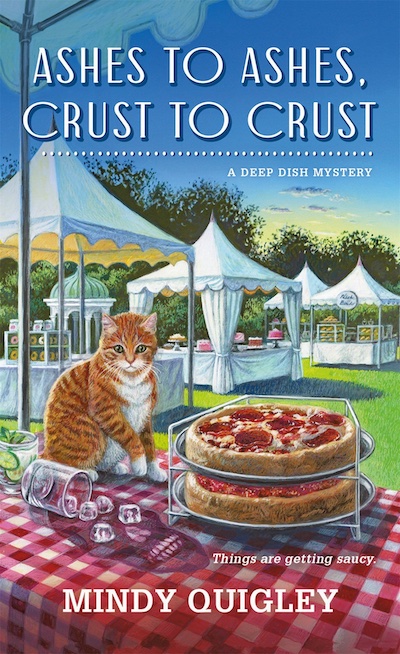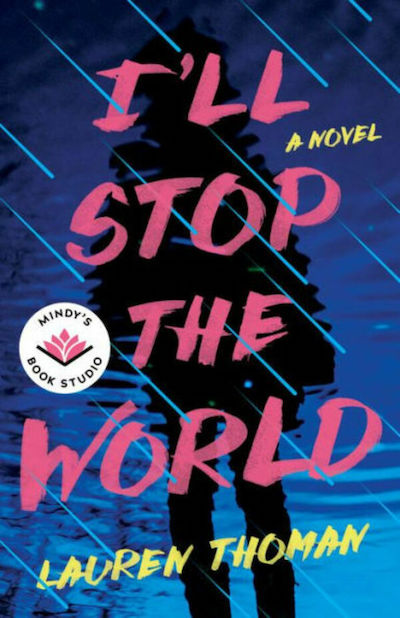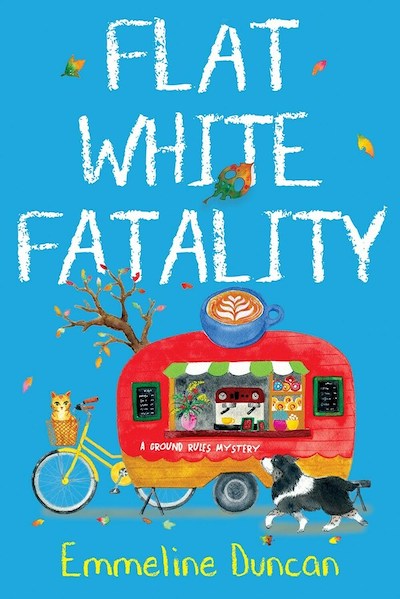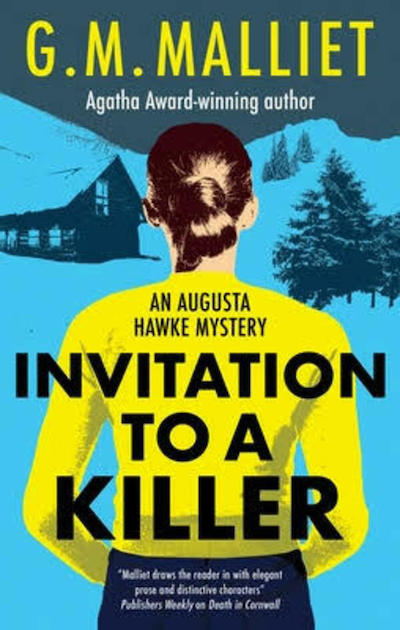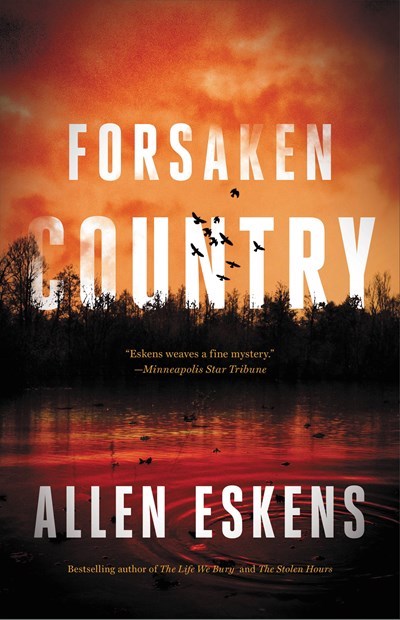First things first: Quigley’s sophomore effort is every bit as witty, character-driven, and well-plotted as last year’s Six Feet Deep Dish. As always, Geneva Bay, Wisconsin chef and pizzeria owner Delilah O’Leary has a few too many things going on. She’s hoping to win the “Taste of Wisconsin” culinary contest, but can’t quite get the recipe exactly right. Her BFF and sous chef, Sonya, is having an affair with none other than the wife of a celebrity chef. And as luck would have it, he’s the judge for the competition. Bad timing! Meanwhile, her pit bull of a great-aunt is suddenly throwing a lot of shade her way. With no explanations. Even Butterball, the cat she shares with her ex-fiancé, wants out. But when visiting the new juice bar—owned by her ex’s annoying girlfriend—she witnesses one of the customers keel over, likely dead from a poisoned smoothie. And before you can say Pretzel Crust Deep-Dish Bratwurst Pizza, Delilah is drawn into some very risky goings-on. The satire is a joy, Delilah’s narration is sheer pleasure, and her restaurant crew provides plenty of balance. This is turning out to be one of the best new cozy series going.
Amateur Sleuth
Growing up, Luke Tremblay loved being sent off to spend his summers with family on a small hamlet on Vancouver Island. Until high school hit and his parents learned he was gay and disowned him. Even his beloved Aunt Marguerite, a full-time island resident, refused to see him. So decades later, when his aunt dies and leaves Luke her estate, including a charming cottage and antique business, it’s a shock. He returns to the island with one goal: sell the properties and get back to Toronto. But when he’s attacked at the cottage by a seemingly random guy, who’s making crazy claims about his aunt, and when that guy is discovered the next morning dead in the garden, Luke can’t help but get pulled deeper into island life. Thanks also go to the Mountie, Sergeant Munro, aka Officer Beefcake, who, wouldn’t you know, was a childhood friend of Luke’s and still harbors a grudge for Luke disappearing all those years ago. There’s plenty to enjoy in this qouzy, from a budding romance to more crimes that need unearthing. And while Luke may not be the most charming of protagonists—he’s just a wee bit bitchy and somewhat of a snob—he’s certainly realistic. For anyone needing a quick vacation, this is it.
Addy Zantz is like a cold-blooded animal, taking his emotions from his environment as some creatures take their body heat from the sun. He’s an Uber driver, working what he calls the River Styx, the loop from LAX to various hotels, all the while investigating the fully clothed-drowning death of Annie Linden, music legend and a customer who turned into a friend. Annie was a contemporary of Joni Mitchell, and seemed to resemble Mitchell in feeling shut off from the world, taking tentative steps into reality through music and trips in Addy’s car, when she sampled humanity in tiny sips. At first, Addy’s investigation seems borne of nothing else to do. But when a friend, an orthodox Jew who’s too much of a stoner to save himself from the accusation, is accused of the crime, with Addy as an accessory, the cabbie must hit the road hard to find out what really happened to Annie. As the best noirs do, The Last Songbird stays inside the mind of its investigator even while the case casts its glance from distant acquaintances to distant times and decisions. This one keeps returning to the same questions even as it explores the possibilities: who was Annie really? And if Addy finds that out, can he find himself? If you liked T. Jefferson Parker’s A Thousand Steps, try this.
It might be a while since you read a book with teenage protagonists. It’s time. This coming-of-age story has characters who are adolescents to the core, spending their too-fast days on intense friendships, pulling away from parents, and fearing that their high school woes are their destiny. Small-town Warren High School in 2023 is the setting, and the story centers on Justin Warren, whose name is no coincidence: the school is named after his grandparents, who were killed in a fire at the school years before, his mother an infant in the car outside. Things haven’t gone well for Justin. He’s not going to college and he’s in love with his best friend, Alyssa Vizcaino (while they’re seatmates in every class because their last names “function as the alphabetical equivalent of an arranged marriage,” she’s not interested). Then there’s a bizarre twist: an accident throws Justin over a bridge and into…1985. He’s not born yet, his grandparents are still alive, and he still has a chance to change his 2023 lot in life. He meets fellow teen Rose Yin (he’s her pen pal who’s come for a fun visit!), and the two set out to solve a mystery that could mean the world to Justin. Romance is thrown in of course, including a sweet same-sex relationship; combined with the mystery and the tricky logistics of time traveling back to your own town and family in the past, this is one to recommend to book groups and all who like an emotional saga.
While I love an old-fashioned cozy as much as anyone—the guest everyone loathes is found dead on the library floor, a fatal slash across a carotid artery, or perhaps a touch too much monkshood in the afternoon tea?—I especially enjoy mysteries located in the present, with settings and characters that are fresh and idiosyncratic. This Portland (OR) based series, Ground Rules, fits the bill perfectly. In the first volume, barista and total hipster Sage Caplin just opens her new coffee cart when, as luck would have it, a corpse is found dead by her wheels. In Double Shot Death, the coffee cart is at a sustainable music festival—how PDX is that?—when a body is found in the woods clutching one of her coffee mugs. In Flat White Fatality, Sage has a side gig modeling as a character for her boyfriend’s game development company, Grumpy Sasquatch Studio. But then, during a team-building event, the most annoying of the company’s coders is murdered, in Sage’s own roastery no less. When another employee is almost killed, Sage realizes she needs to step it up and find the murderer before she becomes suspect number one. Plenty of satire, lots of fascinating local detail, excellent friends and family, and an insider look at the world of special coffees.
Love a good locked-room mystery? Well, here’s a book with two, sort of. Augusta Hawke, crime writer with a developing side gig as an amateur detective, has been invited to a dinner party at the home of Callie Moore, wife of one of Washington, DC’s biggest lobbyists, making Callie herself a sort of demi-goddess. Turns out Callie is eyeing Augusta to ghostwrite her memoirs; in fact, everyone at the dinner has some sort of publishing aspiration. And it’s quite the assemblage, including a congressman and his wife; a CIA couple; and Doc Burke, a famous humanitarian. Augusta may have little interest in ghostwriting, but the menu is delectable, the libations lavish—until the doctor seems to fall asleep. Except you, me, and Augusta all know he’s not sleeping. He’s dead, likely, it turns out, from his heart condition. O.K., it’s not a locked-room mystery if everyone Ubers home, but certainly it has the makings of one. Over the next several months, Augusta researches and ruminates, deciding that indeed the good Doc was murdered, likely poisoned. But how to find the murderer? Augusta decides to host a writers’ retreat, in the Shenandoah Mountain, just for the dinner guests. This crazy/fun plan—yes, it snows abundantly—provides the true locked-room experience. For all who love Augusta’s wit, insights into DC and the publishing industry, and a little bit of Agatha.
A former university librarian, forced into early retirement, takes on a new job cataloging a book collection, only to find herself spending more time solving a crime than applying the Library of Congress subject headings. Jane Hunter is making lots of changes in her life. She’s downsized her home, is living alone—her actress daughter is off on a national tour—and is about to bring in some much-needed funds by cataloging 33-year-old Cameron “Cam” Clewe’s vast crime fiction collection. But on the first day at the job, at Cam’s sprawling mansion, she discovers—wouldn’t you know it?—a corpse on the floor of the library. And not just any corpse. Cam’s latest ex-girlfriend. To make matters worse, several people saw the couple arguing the night before. With handsome Cam the number one suspect, if Jane wants to keep her job, she’s got to keep her boss out of jail, so the two team up to find the real perp. The fun here is in what an odd couple they make. Sherlock Cam has “anxiety, OCD, occasional depression, and a general lack of social awareness.” And while Watson Jane may not have been diagnosed with anything listed in the DSM-5, she’s darn nosey, quite pushy, a bit of a rumor monger, and has some dubious professional ethics (she brings items home, and shows them to a neighbor, without Cam’s permission.) Everything is in place here for a successful series sure to delight traditional cozy readers for years to come. Now let these two go at each other.
his series debut features a woman who’s so glamorous and strong she has a superhero persona, complete with the superhero’s inner conflict. Deirdre Flanagan is a model, a beautiful 19-year-old who purposely makes herself uglier in daily life so she can pass unnoticed. While she loves clothes and the drama of a professional fashion shoot, modeling is very much her nine to five. In her spare time, she works with her doting father and his brother—they’re a former world-champion boxer and an NYC police captain, respectively, and the only parents she has known—to solve crimes against young women. When a woman in a striking red dress falls to her death from the roof of 1 Times Square, Deirdre hits the scene, finding another body as well as unexpected emotions upon viewing the remains. Why this case has hit her so hard and whether she can escape the escalating danger facing those involved with the victim and the case is a mystery that will keep readers rapt—although they’ll also enjoy being dropped into the world of New York City haute couture. Baer, who worked briefly in that world and is the author of the successful Jack Colt series, also offers a gritty contrast to the ritziness of fashion in his protagonist’s personal life: home is her father’s boxing gym, and between that setting and her life as an NYPD sidekick, the sarcasm and bullets keep flying. A fast, absorbing introduction to a daring star.
This is one richly drawn mystery that does a great job of introducing us to a wonderful protagonist, a compelling group of characters, and a fascinating community. Poor 28-year-old pastry chef Chloe Barnes. Not only does her engagement end up in smoke, she gets panned in a review, then learns that her beloved grandmother is being treated for cancer. Time to leave Paris and head home to Azalea Bay, California. But what to do with herself? Fortunately, her Aunt Dawn has an idea: take her fancy, pastry-making skills and apply them to cannabis to create edibles so good they can hold their heads high in the best pâtisseries. Together they begin to plan for a store, Baked by Chloe, when there’s a murder—of a creepy guy who’s loathed by most of the female population of Azalea Bay—and Aunt Dawn ends up the number one suspect. Clearing her aunt’s name draws Chloe further into the past and the community as she creates a list of suspects. The book also goes deep into the weeds (see what I did there?) as Chloe learns the complexity of cooking with cannabis. And did I mention Jake? Cute, single, and lives next door. In this debut, author George has laid the foundation for a series that feels fresh, young, and full of surprises.
Living a remote, punishing existence—he even asks to have the power to his cabin switched off in the Minnesota winter—former homicide detective Max Rupert has run away from his job more than retired from it. All readers know for most of the book is that he shoved a man through a hole in a frozen lake and is living with the aftermath of that choice. But why he did it, and whether he can allow himself to rejoin society, is a mystery. On a visit to town he runs into Lyle Voight, the former sheriff who’s been voted out of the job in favor of a corrupt newbie, and the man’s daughter, Sandy, and grandson, Pip. Seeing a family gives Max an unfamiliar and slightly disturbing feeling—happiness—and he’s helplessly drawn to jump in when, shortly after, Sandy and Pip vanish suddenly from their home. Puzzlingly, all signs point toward a planned absence. Next, we meet the sinister—and I mean sinister—duo behind the disappearance, and soon the chase is on, helped by Max’s former partner, Niki Vang. This thriller does a remarkable job of contrasting evil and love throughout, in the characters’ actions and dialog as well as in Max’s inner struggle between the positive force that keeps him going and the weight of self-loathing that holds him back. The three-dimensional portrayal of Niki, a wise-cracking and kind Vietnamese American detective and love interest, is a bonus. This is one to get lost in.

